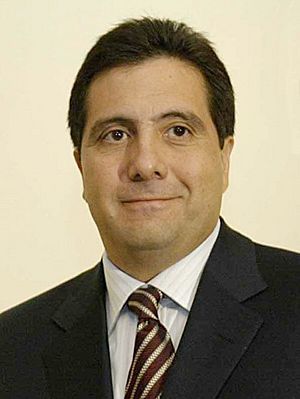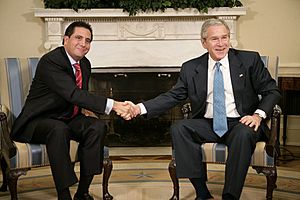Martín Torrijos facts for kids
Quick facts for kids
Martín Torrijos
|
|
|---|---|
 |
|
| 35th President of Panama | |
| In office September 1, 2004 – July 1, 2009 |
|
| Vice President | Samuel Lewis Navarro Rubén Arosemena |
| Preceded by | Mireya Moscoso |
| Succeeded by | Ricardo Martinelli |
| Personal details | |
| Born |
Martín Erasto Torrijos Espino
July 18, 1963 Chitré, Panama |
| Political party | Democratic Revolutionary Party |
| Spouse | Vivian Fernández |
| Alma mater | Texas A&M University |
| Occupation | Economist, politician |
Martín Erasto Torrijos Espino (born July 18, 1963) is a Panamanian politician. He served as the President of Panama from 2004 to 2009.
Martín Torrijos is the son of Omar Torrijos, who was a powerful leader in Panama from 1968 to 1981. Martín studied economics and political science in the United States. After his studies, he returned to Panama and became involved with the Democratic Revolutionary Party (PRD).
He first ran for president in 1999 but lost to Mireya Moscoso. In the 2004 presidential election, he ran again as the PRD candidate. This time, he won against Guillermo Endara. During his time as president, Torrijos worked on improving social security and pensions. He also proposed and started a big project to expand the Panama Canal. After his term, Ricardo Martinelli became president in 2009. Martín Torrijos was also a presidential candidate in the 2024 general elections for the People's Party.
Contents
Early Life and Education
Martín Torrijos was born in Chitré, Herrera, Panama. His father was Omar Torrijos, a well-known leader and social reformer in Panama. Omar Torrijos was in charge from 1968 until he passed away in a plane crash in 1981.
Martín was mainly raised by his mother. His father publicly recognized him when Martín was a teenager. He went to St. John's Northwestern Military Academy in Wisconsin, USA. Later, he studied political science and economics at Texas A&M University in Texas. While in the US, he also worked in Chicago, managing a McDonald's restaurant.
Early Political Role
Before becoming president, Martín Torrijos served as the deputy minister for the interior and justice from 1994 to 1999. This was during the presidency of Ernesto Pérez Balladares. One important action he took was signing a law to privatize Panama's water services. However, this law was not popular, so the Democratic Revolutionary Party (PRD) later changed it back.
Presidential Campaigns
After a plan to allow the previous president to run for a second term failed, Martín Torrijos was chosen to be the PRD's candidate in the 1999 Panamanian general election. He wanted to bring back voters who felt left out after some changes made by the previous government.
His main opponent was Mireya Moscoso. She was the wife of a former Panamanian president, Arnulfo Arias. Her husband had been removed from power by a military coup that brought Torrijos's father, Omar, to power. Moscoso promised to support education, reduce poverty, and slow down privatization. Torrijos often spoke about his father's legacy, using the slogan "Omar lives." In the end, Moscoso won the election.
The 2004 Election Victory
Torrijos ran for president again in the 2004 Panamanian general election. He promised to make democracy stronger and to work on a free trade agreement with the US. He had the support of popular musician and politician Rubén Blades, who later became the tourism minister in Torrijos's government.
Torrijos's main opponent in 2004 was Guillermo Endara, who had been president from 1990 to 1994. Endara promised to reduce crime and government corruption. Torrijos won the election with 47% of the votes, while Endara received 31%.
Presidency (2004–2009)
In May 2005, Torrijos's government suggested increasing pension payments and raising the retirement age. These changes were meant to help pay off Panama's growing foreign debt. However, these ideas led to protests, strikes, and a student shutdown of the University of Panama. Because of this, the plan to raise the retirement age was put on hold. After more opposition from the Roman Catholic Church and union leaders, Torrijos also delayed social security reforms. He did, however, successfully pass a reform measure later in his term.
Panama Canal Expansion
Torrijos also delayed plans for widening the Panama Canal until 2006. In April of that year, he presented a plan for the expansion. He called it "probably the most important decision of this generation." The project was expected to double the canal's shipping capacity. It would also allow larger oil tankers and cruise ships to pass through. The estimated cost was $5 billion. The people of Panama approved the plan in a public vote on October 22, 2006, with 78% voting yes.
International Relations
In November 2006, Torrijos supported a congress that favored Puerto Rico's independence. He strongly urged the United States to recognize Puerto Rico's independence. His government also did not support plans by the Colombian president to build a road through the Darién Gap. Torrijos believed this road could harm ecotourism in the region.
In 2007, Torrijos worked with the US government to create the Panama–United States Trade Promotion Agreement. This agreement was approved in Panama. However, it faced challenges in the US Congress. The agreement was finally approved after Torrijos's time in office, under his successor, Ricardo Martinelli.
By the end of his term, Torrijos was popular again. However, Panama's constitution does not allow presidents to serve two terms in a row. So, the PRD nominated Balbina Herrera to run for president in 2009. She lost to Ricardo Martinelli, who owned a supermarket chain.
Foreign Honors
Martín Torrijos has received special honors from several countries:
 Cuba:
Cuba:
 Dominican Republic:
Dominican Republic:
 Mexico:
Mexico:
 Spain:
Spain:
 Collar of the Order of Isabella the Catholic
Collar of the Order of Isabella the Catholic
 Uruguay:
Uruguay:
See also
 In Spanish: Martín Torrijos Espino para niños
In Spanish: Martín Torrijos Espino para niños
 | Shirley Ann Jackson |
 | Garett Morgan |
 | J. Ernest Wilkins Jr. |
 | Elijah McCoy |


